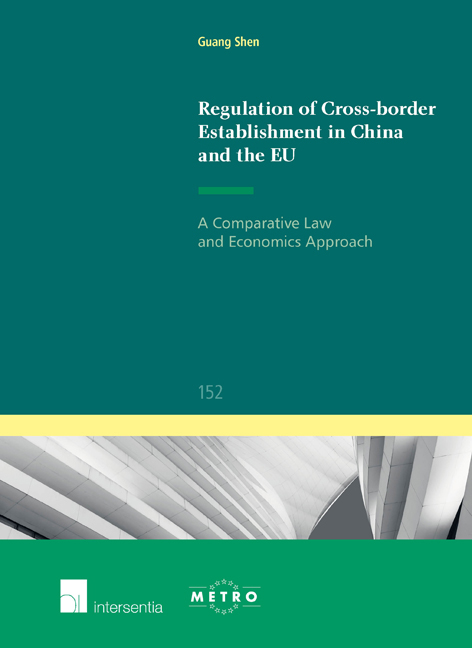Chapter 1 - Introduction
Published online by Cambridge University Press: 13 December 2017
Summary
Societal Problems
It has been pointed out in the literature that enterprises in China usually encounter barriers when they invest across provinces. For example, an empirical study by the Development Research Center of the State Council (2004) demonstrated that businesses in China may be confronted with some barriers in the process of interprovincial investment, including more stringent capital requirements than those made by national law. According to another (more recent) study, protectionist measures are taken by local authorities, which lead to restrictions on the interprovincial establishment of companies and market segmentation.
Despite the above research, there appears to be limited research on how, in practice, rules on the inter-provincial establishment of companies are applied. That being said, the impact of regulation on the inter-provincial establishment of companies should not be underestimated. In 2013, the Communist Party of China announced that it would ‘tidy up and annul all sorts of regulations and methods that impede the national unified market and fair competition.’ Usually, the regulation of inter-provincial establishment on the one hand restricts expansion across provincial borders, while on the other hand it can deter the entry of unqualified companies into local markets.
In contrast to the creation of entry barriers, as discussed above, local authorities sometimes compete with each other to attract investment by non-local businesses. There may even be destructive competition between provinces or regions. For example, Wei and Bi demonstrate that Chinese firms in certain industries tend to relocate their factories from Eastern China to regions with weaker environmental regulation in Central China and Western China. Based on this tendency, it is reasonable to presume that local authorities in Western China and Central China have powerful incentives to engage in a race to the bottom in environmental standards on establishment. The issue of the race to the bottom will be discussed in detail in Chapter 6. Whether or not local officials create entry barriers to non-local firms depends on the specific context, e.g. whether the region concerned is developed or backward.
Ensuring easier inter-provincial establishment can benefit China. Crossprovincial investment by firms has been recognized as one form of capital mobility across provinces in China.
- Type
- Chapter
- Information
- Publisher: IntersentiaPrint publication year: 2016

